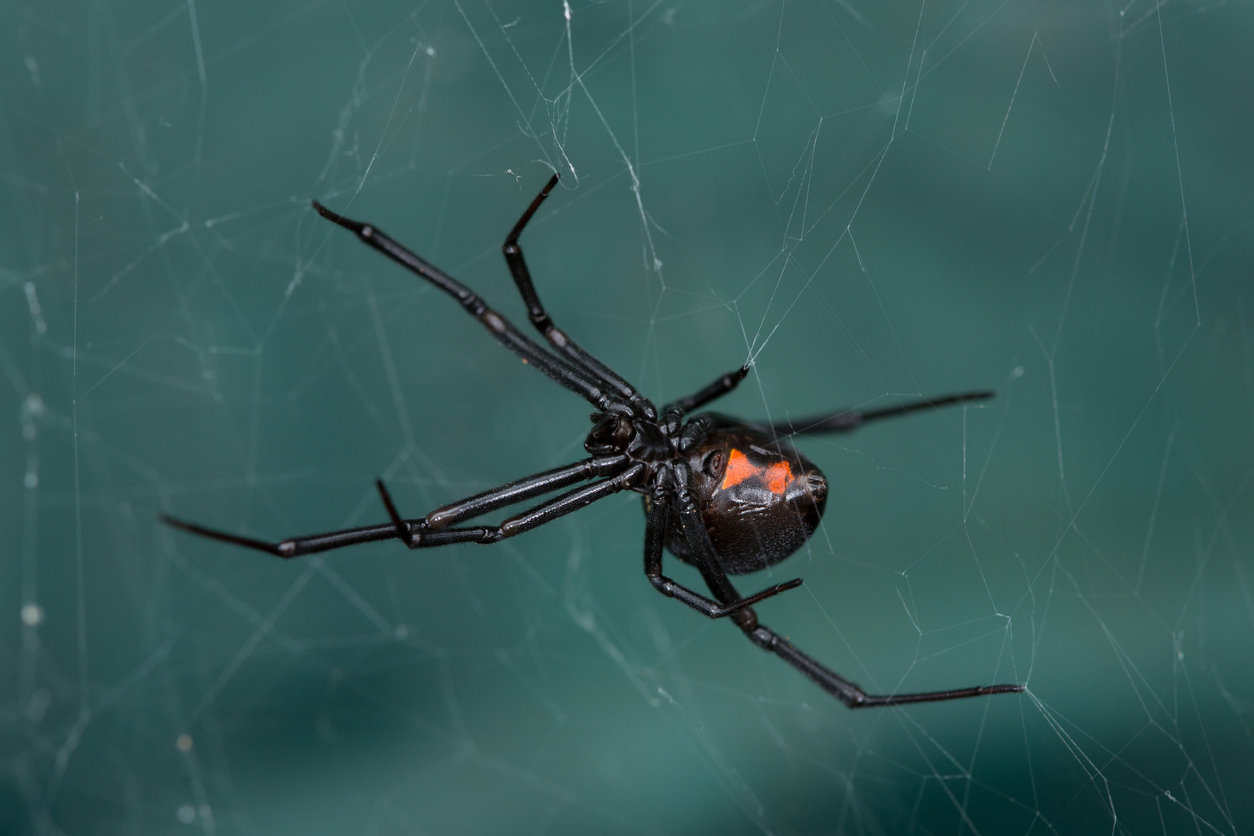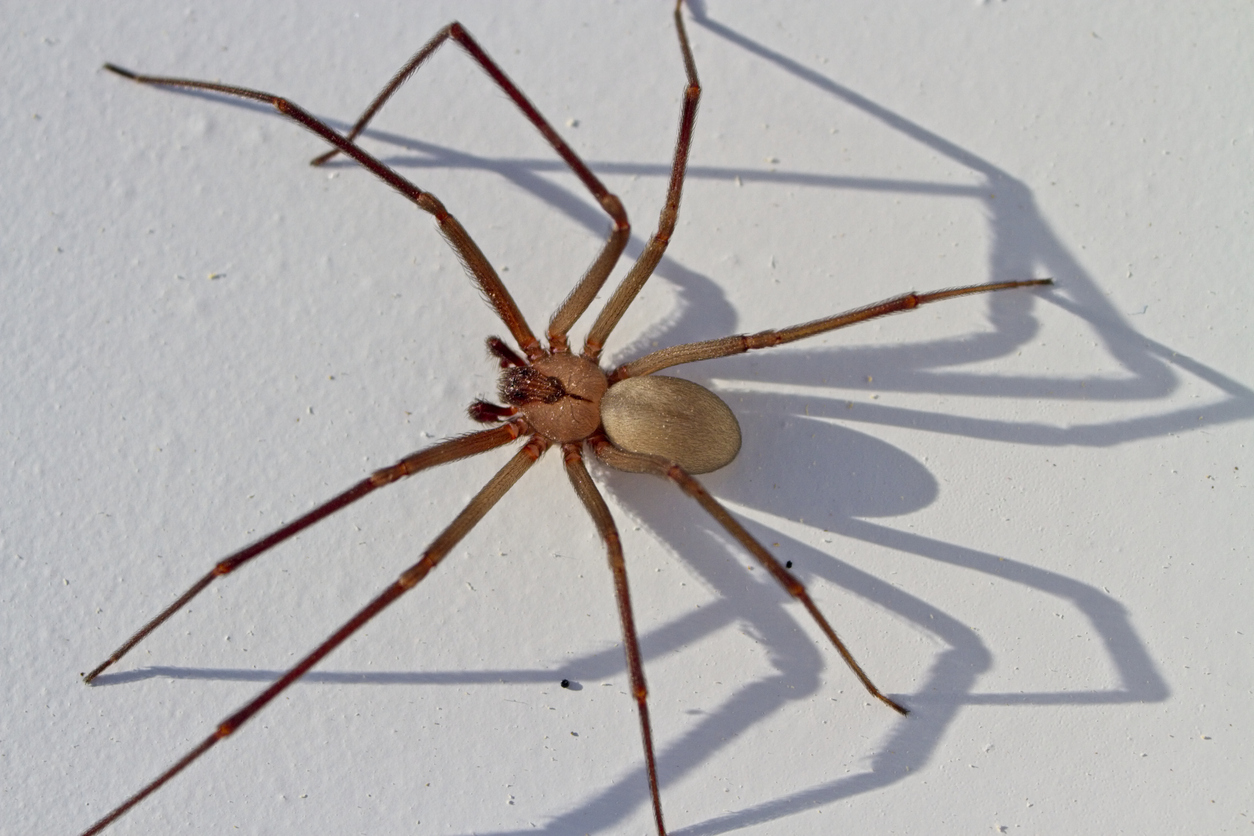My wife hates spiders. My daughter hates spiders. As a medical toxicologist, I know that Illinois’ venomous spiders are about as rare as a Chicago Bears Super Bowl win, but I still perform my solemn spider removal duties in order to maintain the household peace.
Illinois is literally crawling with spiders. The Illinois Department of Natural Resources reports there are over 630 species of spiders in the state, but only two are venomous: the Black Widow and Brown Recluse. The other 600+ spiders may be scary looking, but do not cause physical harm.
Black Widow Spiders
Black Widow spiders can turn up anywhere in Illinois, but they are rare and not commonly seen. They prefer to live in quiet, secluded, undisturbed areas. They can be found outdoors in crevices or recesses within rock piles, block walls, and under patio furniture, or indoors in garages, crawl spaces, barns and sheds. Black Widow spiders are shy and non-aggressive, so human bites rarely occur.
Illinois is home to two types of Black Widow spiders:
- The Southern Black Widow which has a classic, all-black body with a red hourglass on the abdomen—this is the one in most images online.
- The Northern Black Widow is more common on the East Coast but is also found in Illinois. This spider looks slightly different with a separated, broken hourglass that can look like two red dots.

The venom of both Black Widow spiders is a neurotoxin, which is a toxin that disrupts nerve function. If you are bitten by a Black Widow, you’ll likely feel a sharp sting. In severe cases, you’ll then experience full-body muscle cramps, spasms and muscle rigidity, especially in the abdominal area. Dizziness, nausea and sweating also occur. Fortunately, most people recover from a Black Widow bite completely with no lasting effects.
Fun fact: Black Widow mating season is in May, and the females sometimes eat the males afterward. If he escapes, he still dies soon after. Romance is dead, and so is the male Black Widow.
Brown Recluse Spiders
Brown Recluse spiders are native to central and southern Illinois. As seasonal temperatures rise over time, though, their range may extend north. These spiders prefer dark, dry, sheltered places like wood piles, basements, closets and attics.
Also known as the Fiddleback spider (due to a violin-shaped marking on their back), Brown Recluses have six eyes arranged in three pairs. If you’re close enough to count their eyes, you are too close. Brown Recluse spiders aren’t aggressive, and their bites are purely defensive so distance makes for a safe encounter.
Brown Recluse spider bites can have many symptoms. Most bites have no symptoms or minor symptoms such as minor pain at the site. Sometimes a blister may form with an ulcer underneath. In severe cases, the bite may lead to both severe skin damage and systemic effects.
Severe skin manifestations can include a large deep growing ulcer, which can extend into the fat and muscle under the skin. There is no clear cure for this and preventing infection is important. In some cases, those bites may need a skin graft once the spread has stopped. Mild systemic symptoms include a rash, fever, chills and muscle aches. Severe systemic effects include kidney failure, hemolysis (the red blood cells break apart) and shock.

If you are bitten by a spider:
- Wash the area with soap and water. Regularly check the area for signs of infection such as redness, swelling or increasing pain.
- Remove jewelry from the affected limb. It can be difficult to remove jewelry after swelling develops. Otherwise, you might have to explain to an ER nurse why you can’t get your wedding ring off.
- Apply ice to reduce swelling and inflammation.
- Seek medical care if you experience symptoms beyond minor irritation. Most “spider bites” seen in ERs are localized infections from bacteria such as staphylococcus.
- Do not pick at the bite site. To avoid infection, it’s important to keep the area clean.
- Call the Illinois Poison Center at 1-800-222-1222. The nurses, pharmacists and other poison information specialists can assist you 24/7/365.
While Illinois has plenty of spiders, most of them are insect hunters and cannot hurt you. If you happen to cross paths with a venomous one, you are now prepared—with knowledge, IPC’s 800-222-222 helpline and maybe a quieter scream.
Our 1-800-222-1222 helpline is available 24 hours a day, seven days a week. Calls are free and confidential. To learn more about poison prevention, click here for a free Complimentary Safety Packet (available in English and Spanish) that contains a sticker and magnet with IPC’s helpline number, as well as poison prevention tips for every season.

